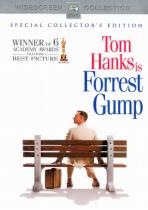Forrest Gump
 Year:
Year: 1994
Film Studio: Paramount Pictures
Genre: Drama, Comedy
Length: 142 Min.
DirectorRobert Zemeckis (1951)
WritingWinston Groom...Original Material By
Eric Roth...Screenwriter
ProducerWendy Finerman
Steve Tisch (1949)
Steve Starkey
CinematographerDon Burgess
MusicAlan Silvestri...Composer
StarsTom Hanks (1956) as Forrest Gump
Robin Wright (1966) as Jenny
Sally Field (1946) as Mrs. Gump
Michael Conner Humphreys as Young Forrest
Review A simpleton with the IQ of a small child is mistaken for a worldly philosophical savant by almost everyone he comes in contact with. They are in such awe of his divined simple sayings that they believe him to be a populist prophet that can lead them back to a fantasy paradise that only dwells in their minds. While I was sitting in a theater watching
Forrest Gump back in the summer of 1994, I couldn’t help but feel a recurring sense of déjà vu. The premise did not seem fresh to me, but I couldn’t remember where I had first viewed this scenario. As I was leaving the theater with my wife, I told her of my feelings about the film we had both watched, and she blurted out that it reminded her of the Peter Sellers film from 1979,
Being There. And just like the inventor that screams
Eureka!!! as he solves a problem that has perplexed him, I realized that she was right.
In Hal Ashby’s
Being There, Chance the Gardener (Sellers) is a middle-aged man who is mistaken for a wizened aristocrat by the upper crust of Washington D.C. society. And although a handful of people know that he maintains the brain power of a third grade child, he is slowly maneuvered into a position of power by the political sheep that flock around him to hear his inane utterances on gardening. It is these pearls of wisdom that he casts before the swine that are mistaken for folksy allegorical solutions to the ills that plagued our nation at the time. Sound familiar? The only difference from this plot and the one detailed in
Forrest Gump is that the latter came wrapped in a package of special effects wizardry that placed Gump into historic scenarios from the sixties, seventies and eighties. Once again the movie going public is given a perfect example of style over substance.
While
‘Chauncey’ Gardener comes across as a contemplative and somewhat charismatic man, Forrest never can really shake his persona of a backwoods bayou bonehead that anyone would be able to unmask as such. In this regard, I found the story of his life to be foolish and extremely far-fetched. There were countless scenes and scenarios in the film that caused both my wife and I to cringe, yet people around us were belly laughing over. As we sat perplexed over the reception that this uninspiring film was receiving from the audience surrounding us, a sense of futility began to set in and we both couldn’t wait for the movie to end.
The saddest situation would take place months later at the Academy Awards as this incredibly average film took the honor of Best Picture for 1994. When film historians in the future look back at the great films that this one beat out for that glorious statuette, they will be as bewildered as my wife and I had been on that sweltering summer day when we wasted two hours of our life. Well, at least the theater was air-conditioned.
Ratings Criterion5 Stars - The pinnacle of film perfection and excellence.
4 ½ Stars - Not quite an immortal film, yet a masterpiece in its own right.
4 Stars - Historically important film, considered a classic.
3 ½ Stars - An entertaining film that’s fun or engaging to watch.
3 Stars – A good film that’s worth a Netflix venture.
2 ½ Stars - Borderline viewable.
2 Stars – A bad film that may have a moment of interest.1 ½ Stars – Insipid, trite and sophomoric, and that's its good points.
1 Star – A film so vacuous, it will suck 2 hours from the remainder of your life.
½ Star - A gangrenous and festering pustule in the chronicles of celluloid.